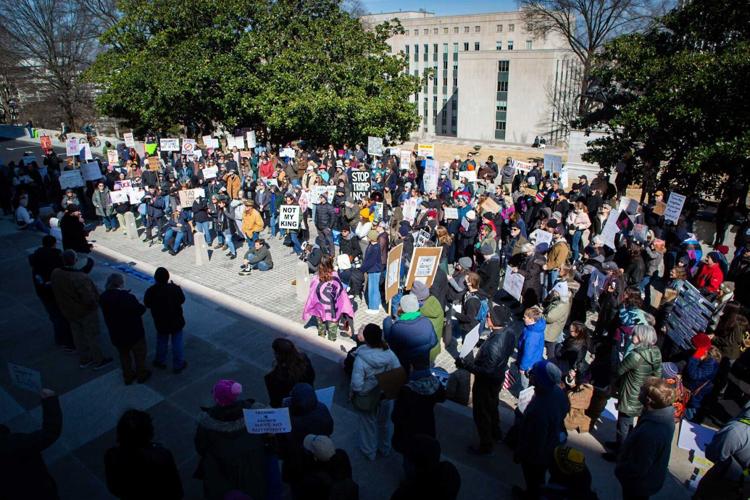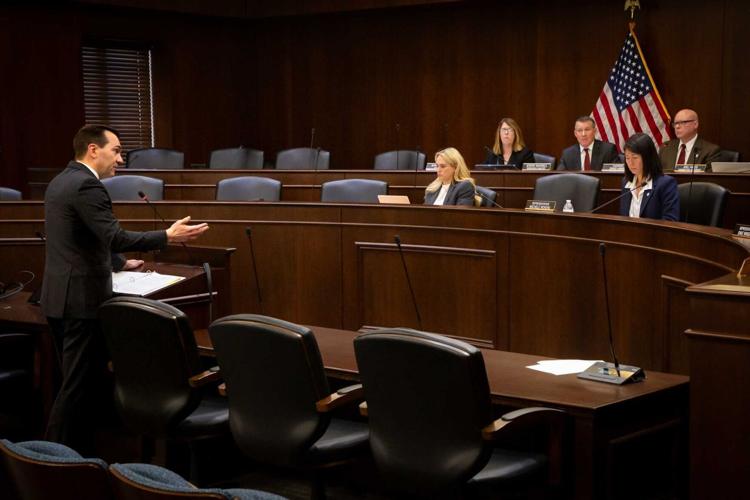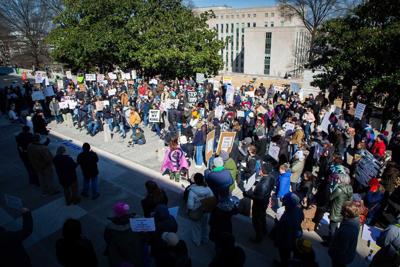This week at the Tennessee General Assembly, Tennessee State University officials made their case (read more in this week's three-part Scene cover story), and state departments brought their budget requests. In addition, bills were proposed related to sidewalks, SNAP regulations and maternal health care.
Tennessee State University officials laid out a financial stability plan at the state Capitol on Wednesday, seeking to use $154.5 million of capital project funds for campus operation expenses.
Amid the historic local university’s financial turmoil, we examine the school’s past and future
In a presentation before the State Building Commission, TSU’s interim president Dwayne Tucker and acting chief financial officer Jim Grady said a proposed five-year plan could reduce the school’s budget deficit by between $32 million and $37 million over the next two years. That plan could include scholarship caps, staffing cuts and a reduction in university programs.
“We need to change the way we’re doing business at Tennessee State,” Grady said. “There are some habits over the last several years, some bad habits that we need to change. People need to be accountable.”
The capital funding the university is requesting is part of the $250 million already allocated for building maintenance and improvements. That money was supposed to be part of $544 million payment back to the university for a history of underfunding found by a legislative committee. TSU graduate and state Rep. Harold Love (D-Nashville) tells the Scene he believes there is a willingness from legislators to find a way to reallocate that money for TSU’s needs now.
“I think legislators .... who have been following for a while, do have an understanding that this is good on several fronts,” Love said. “One, it's not asking for new money — they are asking to convert what has been allocated to operating and reserves. And it's not ignoring the need for addressing deferred maintenance that certainly can come at a later date when we talk about the other $294 million.”
House Speaker Cameron Sexton, who sits on the State Building Commission, said he is open to working with the legislature to allow the university to use the funding for operational expenses, but wants to see accountability benchmarks to ensure TSU is practicing financial responsibility. He also said hikes to the university's tuition rates could speed up a financial turnaround for the school. No action was taken at Wednesday’s meeting.

Hundreds of protesters gather on the steps of the state Capitol on Feb. 17, 2025, as part of a series of nationwide Presidents' Day demonstrations speaking out against President Donald Trump and billionaire Elon Musk
Presidents' Day Protest
On Monday, hundreds of protesters gathered on the steps of the state Capitol as part of a series of nationwide Presidents' Day demonstrations speaking out against President Donald Trump and billionaire Elon Musk. The world's richest man, Musk has led the president's Department of Government Efficiency (DOGE) initiative, which has been cutting staff from numerous federal agencies.
A flurry of politicians and lawyers have decried the actions of DOGE as illegal, with numerous lawsuits targeting the new department's actions. Republican U.S. Rep. Tim Burchett of Tennessee's 2nd Congressional District serves on the new House DOGE subcommittee. He recently told Scene sister publication the Williamson Scene that DOGE could only last a matter of months.
Meanwhile, Tennessee's Republican U.S. Sen. Marsha Blackburn is supporting the cuts in the federal government with the DOGE Acts. Her six bills include a variety of actions, from a one-year freeze on hiring for some federal agencies to an attempt to move "non-national security related agencies" out of Washington, D.C., and one would implement "across-the-board spending cuts" for some agencies.
Budget hearings
Several committees held budget hearings this week from departments throughout the state. The largest part of the Department of Environment and Conservation's request is Gov. Bill Lee’s $24.5 million initiative for the Duck River. The budget also carries a request for the creation of a “regulatory framework” for nuclear power machines. Nuclear fusion operations cannot begin without this regulation said David Salyers, commissioner of the Tennessee Department of Environment and Conservation.
“Nuclear power is the future,” Salyers said. “TVA, the state and private industry are all in on nuclear. This is a race between Tennessee and a couple other states to see who will be first, and Tennessee is leading the way.”
The Department of Correction's budget request included a cost increase of $6.8 million for its private prisons contract with CoreCivic, which runs four locations that house state inmates.
One of those prisons, Trousdale Turner Correctional Center, is the largest in the state. Lawmakers asked the department for clarification on the staffing vacancy rate there compared to other state prisons. The department said the vacancy is around 33 percent at Trousdale, while it is around 26 percent at the other locations around the state.
While the department’s budget passed through the State and Local Government Committee, it will be heard next in the Finance Committee. Though the state requested an increase for the CoreCivic contract, the Tennessee Lookout reports the Department of Correction provided information to the outlet that the state has fined CoreCivic $44.78 million since 2022 for contract violations.

House Democratic Caucus Chair John Ray Clemmons (D-Nashville) presents a bill creating a grant to fund sidewalks in school zones
Sidewalks for Schools
A bill creating a grant to fund sidewalks in school zones passed the House Transportation Subcommittee on Tuesday and will now head to the full Transportation Committee.
House Bill 16 would require the Department of Transportation to create a “student pedestrian protection grant program” that would award funds to local governments for building and maintaining sidewalks around public schools.
Housing for All targets five bills in ongoing effort to address urban, suburban and rural housing crunch
“Right now there's funds to do so if those schools are located on state highways, but as you know, many schools are located off of state highways on backroads, and we have a lot of children in rural and urban areas having to walk in ditches or on the side of the road,” said the bill's sponsor, House Democratic Caucus Chair John Ray Clemmons (D-Nashville), on Feb. 18.
The bill, which is sponsored in the Senate by Sen. Sara Kyle (D-Memphis), would also create a fund for the grant money within the general fund.
SNAP Changes
In the House, the "Tennessee Health SNAP Act" moved forward from the Health Subcommittee. Rep. Jason Zachary (R-Knoxville) and Sen. Rusty Crowe (R-Johnson City) brought the bill, which seeks to prohibit the use of SNAP benefits for the purchase of candy and soft drinks.
Maternal Health Care
A bill from Sen. London Lamar (D-Memphis) and Rep. Harold Love (D- Nashville) that would require TennCare to cover doula care for expecting mothers moved forward in the Senate this week. It’s part of a string of legislation from Lamar, who has introduced doula-related bills each year of her tenure. Doulas are touted as a solution to Tennessee’s high maternal mortality rate, especially for those on TennCare.
Another bill from Lamar and Rep. Caleb Hemmer (D-Nashville) that would require hospitals to provide information on post-birth warning signs passed the House Population Health Subcommittee on Tuesday. It will now move on to the full Health Committee next week.
“[The bill] was based on some legislation that Louisiana did last year that was really looking at this issue, that makes common sense, that doesn't cost any money, that really can move the needle,” Rep. Hemmer said, citing Tennessee Department of Health data on maternal mortality. “So providing some life-saving information and resources upon discharge really seems like the right way to do [it].”
Republicans Take Aim at WHO
A bill that looks to cut the World Health Organization out from the process of responding to a pandemic moved forward in the Senate Health and Welfare Committee earlier this week. Under current law, the Tennessee governor can declare a statewide emergency in response to a pandemic only after the WHO makes an official declaration. The bill brought by Sen. Brent Taylor (R-Memphis) and Rep. Justin Lafferty (R-Knoxville) would move that responsibility over to the Centers for Disease Control and Prevention.
It’s one of two bills that takes aim at the World Health Organization, with another from Sen. Joey Hensley (R-Hohenwald) and Rep. Tim Rudd (R-Murfreesboro) that would prohibit the “enforcement and recognition of requirements or mandates issued by the World Health Organization, United Nations, or World Economic Forum.” President Trump has spoken out against the organization, and recently issued an executive order seeking to withdraw the United States from the organization.










